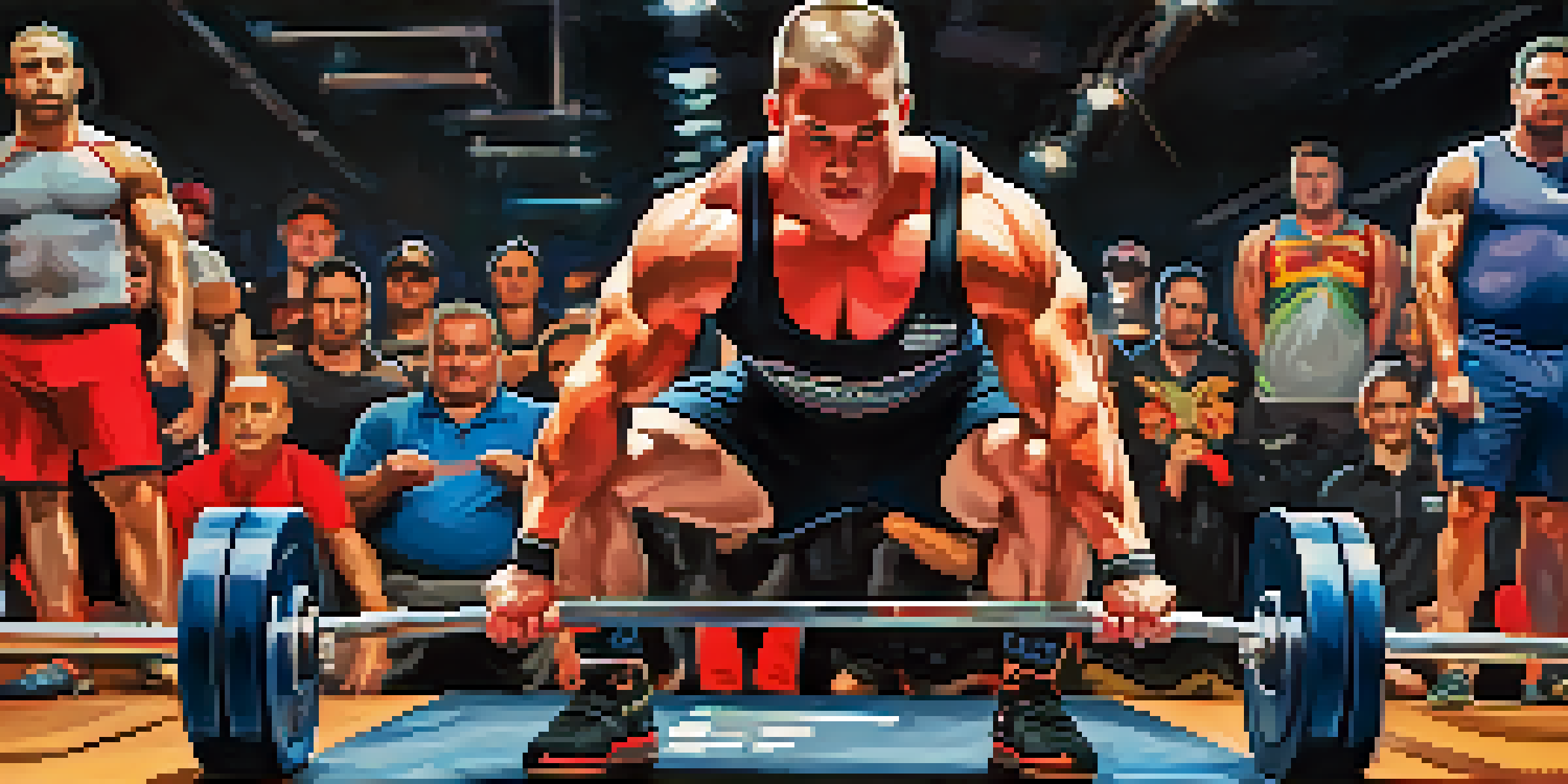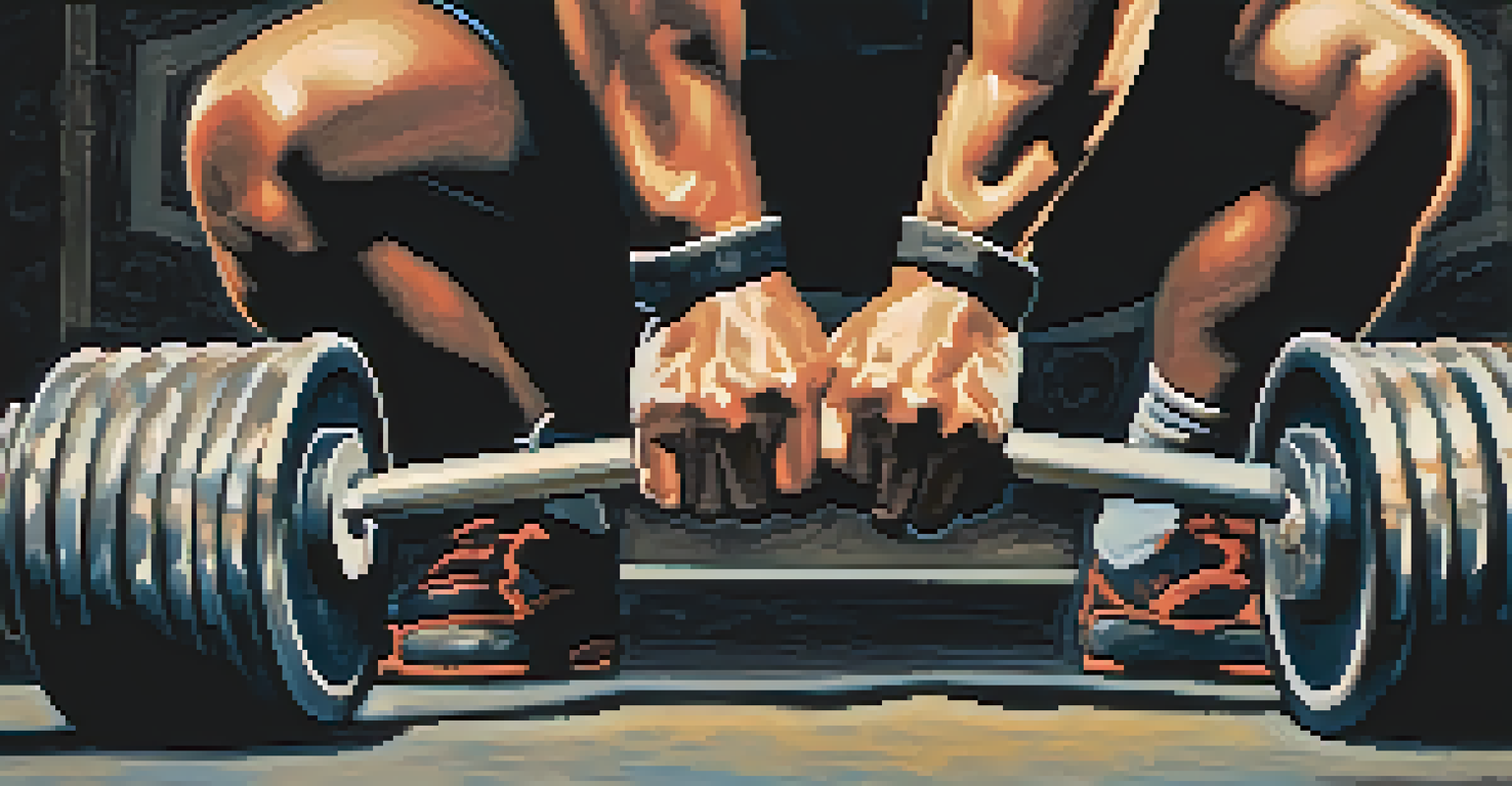What to Expect at Your First Powerlifting Competition Event

Understanding the Basics of Powerlifting Competitions
Powerlifting is a sport that focuses on three main lifts: the squat, bench press, and deadlift. In a competition, athletes perform these lifts to test their maximum strength. Understanding the structure of the competition is crucial, as it will help you prepare mentally and physically for the event.
Strength does not come from physical capacity. It comes from an indomitable will.
Each competitor gets three attempts at each lift, and the goal is to lift as much weight as possible. The total weight lifted across all three exercises determines your overall score. Knowing these basics will help you feel more confident and focused when the day arrives.
Powerlifting competitions can seem intimidating, but they're actually quite supportive. Competitors often cheer each other on, creating a community atmosphere. Embracing this camaraderie can help ease any pre-competition jitters you might have.
Preparing for the Competition Day: What to Bring
On competition day, having the right gear is essential for success. You'll need a few key items like your lifting shoes, a singlet, and knee sleeves if you use them. Don't forget your personal equipment, like belts or wraps, as these can enhance your performance.

Additionally, packing snacks and hydration is vital. You'll want to keep your energy levels up between lifts, so bring foods that are easy to digest, like bananas or protein bars. Staying hydrated is equally important, so carry a water bottle to sip throughout the day.
Key Lifts in Powerlifting
Powerlifting competitions revolve around three main lifts: the squat, bench press, and deadlift, with each athlete striving to lift the maximum weight possible.
Lastly, consider bringing a notebook or a phone app to track your lifts and attempts. This will help you stay organized and focused. Having everything ready will ease your mind and help you concentrate on performing your best.
Understanding the Rules and Judging Criteria
Familiarizing yourself with the competition rules is essential for a smooth experience. Each lift has specific criteria, like depth for squats or pause time for bench presses. Knowing these guidelines can help you avoid disqualifications and ensure your lifts are successful.
Success is the sum of small efforts, repeated day in and day out.
Judges will evaluate your attempts based on these rules, so pay attention to their commands. For instance, you'll need to wait for the 'start' and 'rack' commands during the bench press. Understanding these cues is vital for timing your lifts correctly.
It’s also helpful to watch other lifters and see how they approach their attempts. Observing their routines can give you insight into how to handle your lifts and what to expect from the judging process.
Arriving at the Venue: What to Expect
When you arrive at the venue, the atmosphere can be buzzing with energy. Expect to see a mix of competitors, coaches, and spectators, all there to support the athletes. This lively environment can be both exciting and overwhelming, so take a moment to breathe and soak it all in.
Check-in is usually the first step, where you'll confirm your registration and receive your competitor number. This number is essential for identifying yourself during the competition. Make sure to arrive early to account for any unexpected delays.
Essential Gear for Competition Day
Bringing the right equipment, including lifting shoes and personal gear, along with snacks and hydration, is crucial for a successful competition experience.
After check-in, you'll have time to warm up. This is crucial to prepare your muscles and get into the right mindset. Look for designated warm-up areas and follow the schedule so you can approach your lifts feeling ready and focused.
The Warm-Up Process: Finding Your Routine
A proper warm-up is key to performing well on competition day. Start with some light cardio to get your blood flowing, followed by dynamic stretches focusing on your major muscle groups. This routine will help prevent injuries and prepare your body for heavy lifting.
Next, gradually increase the weight on your warm-up sets. Start with lighter loads and progressively add weight until you reach your opening attempt. This step is crucial as it helps you gauge how your body feels and adjusts your strategy accordingly.
Remember to stay relaxed and calm during your warm-up. It's easy to get caught up in the excitement, but maintaining focus on your lifts will set you up for success. The warm-up is all about finding your rhythm and preparing both physically and mentally.
Competing: The Lifts and What to Anticipate
As your turn approaches, the adrenaline will kick in. You'll take the stage for your lifts, starting with the squat. Make sure to listen closely to the commands from the judges and focus on executing your lift with proper form. This is your moment to shine, so channel that energy into your performance.
After the squat, you'll move on to the bench press. This lift often requires a different mindset, so take a moment to reset and visualize your success. Remember to breathe and stay composed as you approach the bench; a calm mindset can make a world of difference.
Warm-Up and Mental Preparation
A proper warm-up routine and maintaining a calm mindset are vital for optimizing performance and showcasing your strength during the competition.
Finally, the deadlift caps off the competition. This lift is often the most thrilling, as it tends to be where lifters can truly showcase their strength. As you step up to the bar, remember that you've trained hard for this moment, and trust in your preparation.
Celebrating Your Achievements: Post-Competition Tips
After the competition, take time to celebrate your achievements, regardless of the outcome. Each lift and every moment spent preparing has contributed to your growth as an athlete. Reflect on your performance, and consider what went well and what can be improved next time.
It's also a great opportunity to connect with fellow lifters. Share experiences, tips, and stories, as this camaraderie can enhance your journey in the sport. Building relationships with others who share your passion can provide support as you continue to progress.

Lastly, don’t forget to rest and recover after the event. Your body has worked hard, and taking time to recuperate is essential. Whether you treat yourself to a nice meal or a relaxing day off, honoring your efforts will help you stay motivated for future competitions.